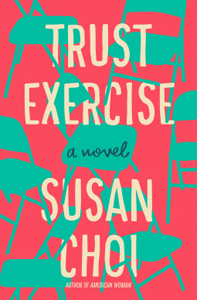Susan Choi’s “Trust Exercise” (2019) is one of the best novels I’ve read about how misplaced/abused trust between children and adults can lead to lifelong trauma. Without descending into lecture or even stark metaphor, Choi crafts an elite, character-driven illustration of how the abusers in the halls of Hollywood power thrived for decades up until being somewhat exposed by the #MeToo movement.
“Trust Exercise” begins as the story of Sarah and David, two 1980s teens at a prestigious art-focused school in a broiling hot Southern city – perhaps Houston (where Choi attended an arts school), perhaps somewhere else.
They are that classic couple that many people will remember from their high school days. As Choi puts it in one of her many wonderful turns of phrase, Sarah and David have an invisible tether between them, and other students give them a wide berth so as not to trip over it.

“Trust Exercise” (2019)
Author: Susan Choi
Genre: Character drama
Settings: Early 1980s, 1997, 2013; unnamed Southern city
Note to readers: The Book Club Book Report series features books I’m reading for my book club, Brilliant Bookworms.
They love each other to the depths that that word means anything, but they are also sophomores, so they can’t maturely deal with it. One slight from Sarah – declining to open David’s gift amid a crowd – peeves David. One slight from David – dating a popular senior – peeves Sarah.
Choi does not spend more words on the major moments than she does on the emotional fallout of big moments or collected moments. In fact, she spends no words at all on what by book’s end we’ll realize is a huge moment that happened to Sarah despite it not appearing in the narrative.
I must institute a SPOILER WARNING here to delve further.
Don’t trip over the triptych
Choi ingeniously pares “Trust Exercise” into three sections. Having finished the book, I recommend trusting Choi’s unorthodox choice of structure even if it seems bizarre, maybe even bordering on pretentious, and even though it leaves multiple narratives unfinished.
The first section is the first part of a novel, which we learn in the second section was written by Sarah based on her experiences. It’s a gripping teen drama, like a chillier answer to “My So-Called Life” with the circling romance, an outcast student, a girl friend pushed to the curb, and a friend’s mom who is the wanted parental figure but not the needed one.
By being set further back – the Eighties rather than the Nineties — we believe in the plausibility that an arts school is an absolute playground for a sexual predator who is lauded by the surrounding town. But Sarah leaves out the part where she is sexually taken advantage of by Mr. Kingsley in his office; we pick up on this event by reading between the lines in the second section, which is classmate Karen’s reaction to Sarah’s 1997 novel.

Bad Good Teachers
So Choi is examining issues of memory and recognition. And also a victim’s competing desires to bury bad memories and to expose predators to protect today’s kids in a way they were not protected. Contrasting Sarah, Karen is an honest and open narrator in regard to her feelings, although she hides her goals from us.
By this point – even though she abandons Sarah’s narrative on page 131 (which is the point up to which Karen has read the book) — Choi has made “Trust Exercise” into a compulsive page-turner in a fascinatingly mysterious way.
We are invested in Sarah and want to know her past story via Karen’s starker truth-telling. And we are invested in Karen and are curious about her one-off return to B-grade theater. In a play directed by David, Karen is going to co-star with a British adult teacher, Martin, who was part of that back-halls brotherhood of sexual abusers in the Eighties.
There’s a mysterious nature to the overarching point of “Trust Exercise” at this point, yet we are bombarded with emotional truths that heighten the points about adult-child trust, sexual predators amid institutions, and even the false promises of elite prep schools.
A fascinating imbalance
If Choi didn’t show so much sharpness of purpose in other areas, I’d suggest it’s accidental that she portrays a school that gets richer and richer without actually producing many Hollywood success stories. Sarah points to a girl who goes on to a long-running cop-show gig, and a boy who becomes an opera star, but we’re overwhelmed by the number of students who went on to no career whatsoever in drama – people who disappear into fast-food management gigs, or off the face of the earth.
The author illustrates impressive drama-class exercises by Mr. Kingsley. We can see how the lessons would effectively lower inhibitions or at least separate the wheat from the chaff. He seems like a truly good acting teacher who enhances his students’ talents, even if he doesn’t show them a practical path to a paid career.
At least those students he doesn’t abuse. The ones he does abuse likely constitute a small percentage – otherwise he’d get exposed even long before #MeToo – but Choi shows how the impact on the abused kids’ lives is substantial. The traumatic trust-breaking incidents are ever-present even when the person buries the memory (Sarah in relation to Mr. Kingsley) or acknowledges that it was a consensual act, but that their immaturity was taken advantage of (Karen in relation to Martin).
Further keeping a reader off balance, Choi’s portrayal of sex ranges from erotic to disgusting, and from tender to violent — in an emotional sense rather than physical. (Physically, most of the kids could fight off the abusers, but there’s more to it than that.)
Multiple times, she describes sexual discharges as “slime,” even when the inhibited Sarah is the narrator. The gross, animal nature of humans plays off the other-times beautiful prose in a way that can’t be brushed aside. The mind’s gears spin to try to sort out the uncomfortable imbalance.
Breaking the cycle of broken trust
In the third section, Choi comes full circle on her triptych of trauma, introducing Claire in 2013. So Sarah’s novel is never presented in full to the reader. Instead, the first part of Sarah’s reality-inspired piece of fiction is a springboard for Karen, and then all the Eighties and Nineties events are a springboard for Claire, who seeks information on her birth parents.
I recall another triptych, “The Burden” (1956) by Mary Westmacott (Agatha Christie). There, I was impressed by the experimental structure and engrossed by how three characters influence each other’s lives even while being caught up in their own.
But “Trust Exercise” reaches a next level in the way it’s a profound character study even when (or even because) all the characters are hiding a lot of raw facts from the reader. Choi crafts a crystal-clear emotional journey even when details are hidden behind false names, and even when there are three POVs and two of the narratives go uncompleted on the page.
And “Trust Exercise” has that masterpiece-status-clincher wherein it illustrates how powerful immoral people stay powerful – without ever lecturing us or making it the blatant Point of the Novel. In penning a story about horrific teachers, Choi herself is a great one.

